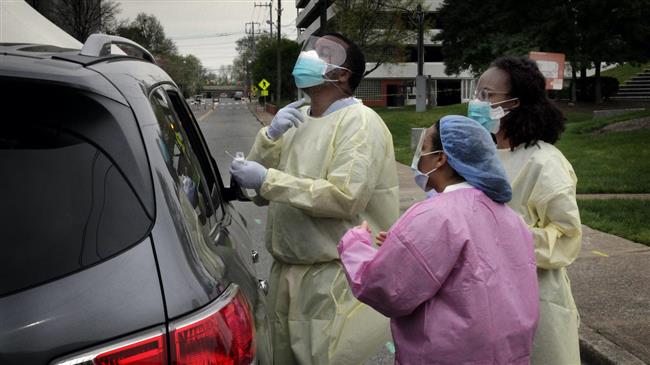
While more affluent parts of Nashville have had testing sites for weeks, this drive-through testing site at Meharry Medical College, in a historically African American neighborhood, experienced weeks of delays because staff couldnít acquire the needed testing supplies and gear like masks and gloves. It finally opened March 30. KEN MORRIS/MEHARRY MEDICAL COLLEGE
Data from US states shows that the coronavirus is wreaking havoc in African American neighborhoods, highlighting disparities in health and inequalities in access to medical care.
African Americans make up just 14.6% of the Illinoisí population, however, the stateís public health agency says black people account for 30% of the stateís cases and about 40% of its coronavirus deaths, showing that African Americans are more likely to die from COVID-19.
In Chicago, black people account for half of all coronavirus cases in the city and more than 70% of deaths, despite making up 30% of the population.
Mayor Lori Lightfoot said the coronavirus was "devastating black Chicago".
Public health commissioner Dr Allison Arwady said Chicagoís black residents already lived on average about 8.8 years less than their white counterparts.
In the state of Michigan, black people make up 14% of the population, but the state health department said they account for 33% of the coronavirus cases and 41% of deaths.
Figures from the state health department showed white residents account for about 23% of recorded cases in Michigan and 28% of deaths.
Also, African Americans in the New Orleans area, where the majority of residents are black, account for 40% of Louisianaís coronavirus (COVID-19) deaths.
"Weíre going to try to figure out what that is attributable to and what we can do about that is as quickly as possible," Governor John Bel Edwards said.
In Milwaukee, Wisconsin, black people make up almost half of the nearly 1,000 cases of the coronavirus and 81% of its 27 deaths. This, as they account for 26% of the population there.
Wisconsin Governor Tony Evers says he wants to know why black communities seem to be hit so hard. "Itís a crisis within a crisis," Evers said in a statement.
In Memphis, Tennessee, reports said that most coronavirus screening was happening in the predominantly white and well-off suburbs, not the majority black, lower-income neighborhoods.
The bio-tech data firm Rubix Life Sciences, based in Boston, Massachusetts, found that an African American with symptoms like cough and fever was less likely to be given one of the scarce coronavirus tests.
Dr Summer Johnson McGee, dean of the School of Health Sciences at the University of New Haven, said she was not surprised that the US black population is experiencing a worse outcome during the pandemic. Racism has led to a lack of investment in African American communities and worse health care for the population in general, McGee said.
"A pandemic just magnifies the disparities in healthcare that many communities of color face," she said.
The World Health Organization has said that people with underlying symptom like asthma, diabetes and heart disease appear to develop serious illness after contracting the coronavirus.
McGee said, "That makes the COVID-19 particularly dangerous for African Americans, who because of environmental and economic factors have higher rates of those illnesses."
Dr Cameron Webb, an African-American physician in the state of Virginia, told BBC News that US racial and economic disparities were being amplified by the pandemic.
"It really exposes our societyís fault lines," he said.
Kristen Clarke, executive director of the National Lawyers Committee for Civil Rights Under Law, said race data was essential information for leaders to have so that federal, state and city resources can be distributed fairly, Reuters said.
There were over 367,000 confirmed coronavirus cases and more than 10,000 deaths in the US as of early Tuesday morning, according to Johns Hopkins University data. US officials warn this will be the toughest week yet.
SOURCE: PRESS TV
LINK: https://www.ansarpress.com/english/15569
TAGS:






























 online news tv
online news tv




